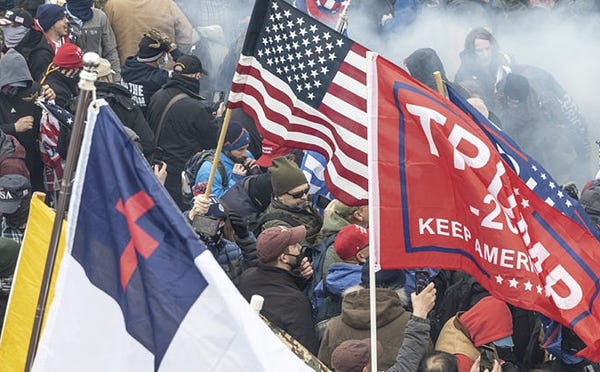The role of social and right-wing media in priming the base for the claim that the election was fraudulent is by now well understood. The role of the faith-based messaging sphere is less well appreciated. Pastors, congregations and the religious media are among the most trusted sources of information for many voters. Christian nationalist leaders have established richly funded national organizations and initiatives to exploit this fact. The repeated message that they sought to deliver through these channels is that outside sources of information are simply not credible. The creation of an information bubble, impervious to correction, was the first prerequisite of Mr. Trump’s claim.
The coup attempt also would not have been possible without the unshakable sense of persecution that movement leaders have cultivated among the same base of voters. Christian nationalism today begins with the conviction that conservative Christians are the most oppressed group in American society. Among leaders of the movement, it is a matter of routine to hear talk that they are engaged in a “battle against tyranny,” and that the Bible may soon be outlawed.
A final precondition for the coup attempt was the belief, among the target population, that the legitimacy of the United States government derives from its commitment to a particular religious and cultural heritage, and not from its democratic form. It is astonishing to many that the leaders of the Jan. 6 attack on the constitutional electoral process styled themselves as “patriots.” But it makes a glimmer of sense once you understand that their allegiance is to a belief in blood, earth and religion, rather than to the mere idea of a government “of the people, by the people, for the people.”
David French:
Of all the remembrances of January 6, the most searing for me was a simple tweet thread. It came from a Presbyterian pastor named Duke Kwon, and it was a photo compilation of Christian imagery on January 6. There were crosses, Bibles, public prayers, and Christian flags amid the tear gas. In fact, Christian flags and symbols were on the front lines of the fighting, carried like men used to carry regimental colors into battle.
It’s hard to think of the worst image, but the picture below—which combines the Christian flag with an American flag and a Trump flag—almost perfectly captures the syncretism of Trumpist Christianity:
I’ve written at length about Christian nationalism generally and the specific version of Christianity that was suffused throughout Trump’s effort to steal a national election. But I want to write about something a bit different, about the definition of a “Christian nation” and the sense that America is (or was) a Christian nation that is now moving to a “post-Christian” future where it will become increasingly difficult for faithful Christians to find a home here and to feel welcome in their own communities.
...
But as much hostility as I’ve seen and experienced from some secular leftists in response to the public expression of my Christian values, nothing compares to hostility I’ve seen and experienced from self-identified Christians when I rooted my opposition to Donald Trump in the same Christian values that sometimes earned me scorn in the Ivy League.
In other words, Christians were more hostile to my public expressions of my values than the secular left ever was. And I’m far from alone. Where does that cut on the question of whether it’s easy or hard to publicly and authentically live out your Christian faith? And who’s hostile to that faith?

